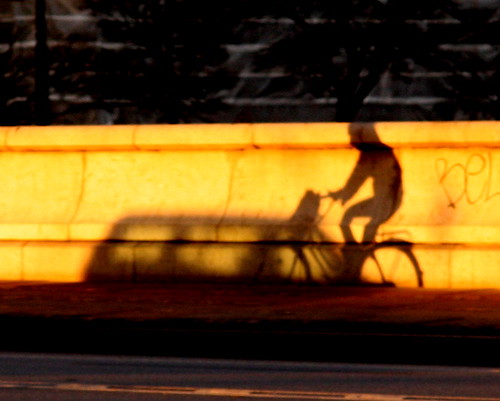
Something new here on Copenhagenize.com. We've enlisted the help of sociologist Dave Horton, from Lancaster University, as a guest writer. Dave has written a brilliant assessment of Fear of Cycling in an essay and we're well pleased that he fancies the idea of a collaboration. We'll be presenting Dave's essay in five parts.
Dave Horton is a sociologist and lover of all things cycling. He is part of the Cycling and Society Research Group, which has pioneered a ‘cultural turn’ in cycling studies and which holds an annual symposium in the UK. Dave works at Lancaster Environment Centre, Lancaster University, on the project ‘Understanding Walking and Cycling’. He tries to do, to write about, and to promote all kinds of cycling, because cycling is essentially good.
Fear of Cycling - by Dave Horton - Part 01 of 05 Most people seem finally to have realised that cycling is ‘a good thing’, but many still don’t cycle. So what stops them getting on their bikes? Explanations typically focus on physical factors such as climate, hills and infrastructure. Emotional barriers to cycling are easily overlooked, but are also massively important. Chief among these emotional barriers is a fear of cycling. You probably already know this – certainly in the UK, talk to friends who don’t cycle and you quickly figure out that they actually feel a bit scared at the prospect of cycling.Most obviously this fear relates to anxieties about being in close and unprotected proximity to speeding cars, it’s to do with a fear of crashes, injury and death. But fear of cycling is also more complex than this. People on bikes move through public space in a much more open, less mediated way than people in cars. That’s one of the pleasures of cycling, but it also potentially heightens feelings of existential vulnerability. Some people also undoubtedly fear looking inept on a bike, fear working their bodies in public, fear harassment or violence from strangers. Cities are full of fear, which is partly why and partly because people move in cars. Fears of cycling are socially, geographically and historically variable, which is to say that they will depend on who you are (man, woman, child, young, old, black, white, fat, fit), where you are (Copenhagen, Brussels, Mumbai, town, countryside, road, cycle path), and when (day, night, rush hour, weekend, winter, summer, a century ago, now, the future …). Over time, some of these fears will also tend to become culturally embedded, and therefore hard to change. But it’s worth trying to change them.I will explain later how fear of cycling is constructed, but I want also to make clear that it is real. Motorised metal objects can and do maim and kill, and in our cities they are everywhere. As people in cars are made to feel safer, the standards of driving experienced by those on the outside decline. People on bikes feel more threatened, less safe. In the UK, across the second half of the twentieth century, people took the sensible option – they got off their bikes. Cycling and cities deteriorated. Now, finally, we’re trying to win both back.Fear of cycling is sensible. But advocates of cycling are also sensible in trying to persuade people otherwise. They quite rightly tell people that cycling is highly unlikely to kill you, and that cycling is objectively safer than horse-riding, or white-water rafting, or golf, or gardening, or something. Besides, not cycling is much more dangerous for your health than cycling. So where are we up to? Some people fear cycling. We would rather they didn’t, because more people on bikes has to be a good thing. But rather than simply dismiss people’s fears of cycling, or try to persuade the fearful that they’re wrong, I think it’s worth exploring further how these fears of cycling get created. If we can understand the mechanisms by which cycling becomes constructed as dangerous and to be feared, we might be better able to confront and challenge those mechanisms directly, rather than the emotions to which they give rise. That’s why I wrote this article, now presented as a series here on Copenhagenize.com.Series:
Fear of Cycling - Part 01 - Introduction
Fear of Cycling - Part 02 - Constructing Fear of Cycling / Road Safety 'Education'
Fear of Cycling - Part 03 - Helmet Promotion Campaigns
Fear of Cycling - Part 04 - New Cycling Spaces
Fear of Cycling - Part 05 - Making Cycling Strange





